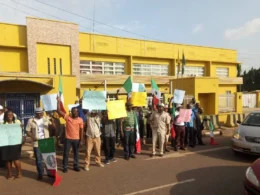The Trade Union Congress (TUC) of Nigeria has voiced strong opposition to the recent increase in the pump price of Premium Motor Spirit (PMS), commonly known as petrol, and the rise in electricity tariffs. The TUC’s President, Festus Osifo, expressed deep concern over the potential impact of these hikes on the Nigerian populace.
- Shock and Dismay: The TUC described the fuel price increase as shocking and distressing. They argue that this sudden hike will significantly worsen the existing economic hardships and increase poverty levels across the country.
- Lack of Consultation: The union criticized the government for implementing the price hike without consulting relevant stakeholders. This, they claim, shows a disregard for the welfare of Nigerians, particularly the working class who are most affected by such decisions.
- Impact on Living Standards: The TUC warned that the increase in both fuel and electricity costs would have a detrimental effect on the cost of living. They highlighted that these hikes come at a time when many Nigerians are already struggling with unprecedented hardship.
- Electricity Tariff Concerns: The TUC also raised alarms about the 250% increase in electricity tariffs, which they say will disproportionately affect the poorest members of society. They criticized the timing and scale of this increase, arguing it reflects a lack of empathy from the government.
- Call for Reversal: The union is demanding an immediate reversal of the fuel price hike and the electricity tariff increase. They argue that such measures are necessary to mitigate the negative impact on ordinary Nigerians.
- Criticism of Government Spending: The TUC criticized the government for not taking steps to reduce the cost of governance or improve the value of the Naira. They suggested that more effective policies and resource management are needed to address the country’s economic challenges.
The TUC’s statement reflects broader concerns about the rising cost of living in Nigeria and the need for more considerate and effective economic policies.









